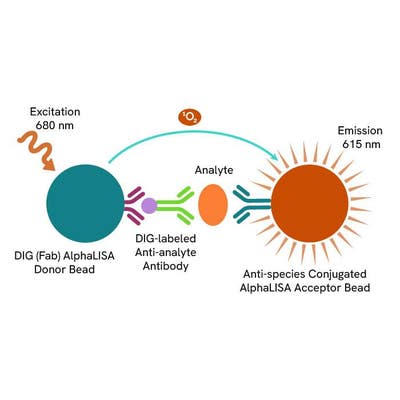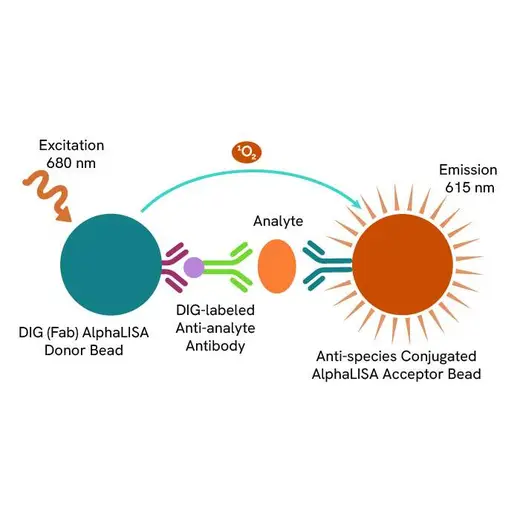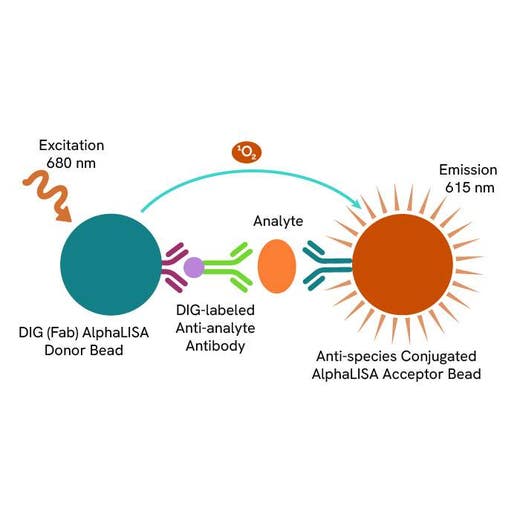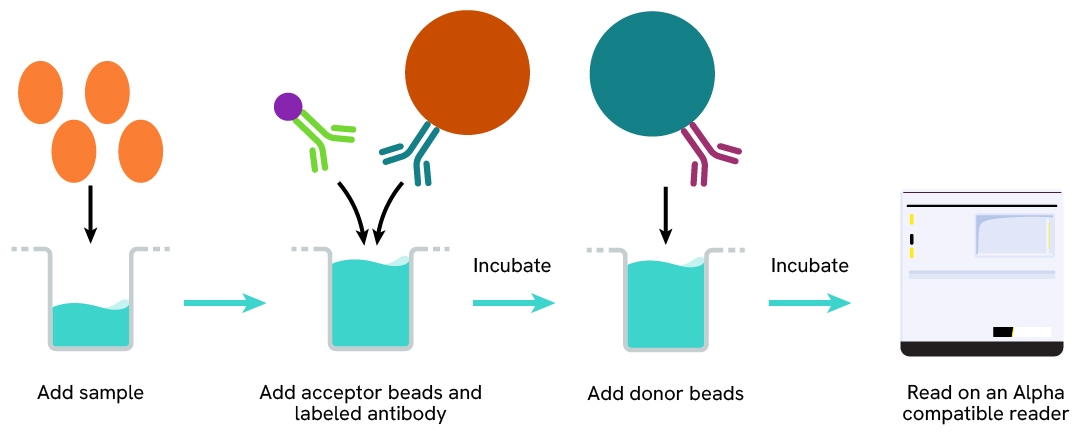

AlphaLISA HIV p24 Biotin Free Detection Kit, 100 Assay Points








| Feature | Specification |
|---|---|
| Application | タンパク質定量 |
| Dynamic Range | 10 - 100,000 pg/mL |
| Limit of Detection | 9.6 pg/mL |
| Limit of Quantification | 35.4 pg/mL |
| Sample Volume | 10 µL |









Product information
Overview
Formats:
- Our HV (100 assay point) kits allow you to run 100 wells in 96-well format, using a 100 µL reaction volume (10 µL of sample).
- Our 500 assay point kit allows you to run 500 wells in 96-well or 384-well format, using a 50 µL reaction volume (5 µL of sample).
- Our 5,000 assay point kit allows you to run 5,000 wells in 96-well or 384-well format, using a 50 µL reaction volume (5 µL of sample).
Features and Benefits:
- No-wash steps, no separation steps
- Compatible with high biotin samples, including RPMI and high-biotin tissue extracts
- ELISA alternative technology
- Sensitive detection
- Broad sample compatibility
- Results in less than 3 hours
Immunodeficiency Virus (HIV) p24 is the 231 amino acid phosphorylated protein of the capsid forming the conical core of the virus that encapsulates the genomic RNA-nucleocapsid complex. HIV p24 is a cleavage product of the p55 Gag polyprotein by viral proteases. HIV p24 and its 55 kDa precursor play a crucial role in the assembly, maturation, and disassembly of HIV p24 can often be detected two weeks after infection. Subsequently, p24 antibody is produced and complexes with soluble p24 antigen, rendering it undetectable without first dissociating the antibody-antigen complex. Free antigen reappears later in the course of the illness as p24 antibody levels decline. p24 is frequently used for HIV detection in blood, serum samples, and other bodily fluids in acute HIV seroconversion, in neonatal infection, and for monitoring of responses to antiviral drug therapy.
AlphaLISA technology allows the detection of molecules of interest in a no-wash, highly sensitive, quantitative assay. In an AlphaLISA biotin-free assay, a DIG-labeled anti-analyte antibody binds to the anti-DIG-coated Donor beads while another anti-analyte antibody is conjugated to AlphaLISA Acceptor beads. In the presence of the analyte, the beads come into close proximity. The excitation of the Donor beads causes the release of singlet oxygen molecules that triggers a cascade of energy transfer in the Acceptor beads, resulting in a sharp peak of light emission at 615 nm.
How it works
Principle of the AlphaLISA biotin-free assay
The AlphaLISA Biotin-Free assay is based on an AlphaLISA sandwich immunoassay involving a digoxigenin anti-analyte antibody bound to anti-DIG AlphaLISA Donor beads and an anti-analyte antibody conjugated to AlphaLISA Acceptor beads. Both antibodies are directed against the analyte of interest. In the presence of the target, both antibodies bind to analyte and the beads come into proximity. The excitation of the Donor beads provokes the release of singlet oxygen molecules that triggers a cascade of energy transfer within the Acceptor beads, resulting in emission with λmax at 615 nm. The intensity of the signal is directly proportional to the concentration of analyte present in the sample.

Protocol of the AlphaLISA biotin-free assay
The AlphaLISA Biotin-Free assay can be run in a 96- or 384-well detection plate (50 µL final). As described here, samples or standards are dispensed directly into the assay plate for the detection of the analyte of interest by AlphaLISA reagents. No washing steps are needed. The protocol can be further miniaturized or upscaled by simply resizing each addition volume proportionally.

Specifications
| Application |
Protein Quantification
|
|---|---|
| Automation Compatible |
Yes
|
| Brand |
AlphaLISA
|
| Detection Modality |
Alpha
|
| Dynamic Range |
10 - 100,000 pg/mL
|
| Limit of Detection |
9.6 pg/mL
|
| Limit of Quantification |
35.4 pg/mL
|
| Product Group |
Kit
|
| Sample Volume |
10 µL
|
| Shipping Conditions |
Shipped in Blue Ice
|
| Target |
p24
|
| Target Class |
Biologics
|
| Technology |
Alpha
|
| Therapeutic Area |
Virology
|
| Unit Size |
100 assay points
|
Video gallery
Resources
Are you looking for resources, click on the resource type to explore further.
AlphaLISA™ technology is a highly sensitive, easy-to-use, and reproducible method for detecting and quantifying molecules in...


How can we help you?
We are here to answer your questions.






























